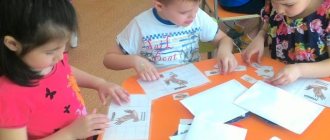The role of socially significant projects in the development of preschool education
Development of preschool education in the city of Novocherkassk
Ch. Education Department specialist
Administration of the city of Novocherkassk
Muravyova O.Yu.
The main source of financing for preschool education is and will remain in the near and distant future precisely the budget funds of municipalities. and also (to a relatively small extent) parental fees.
In connection with this topicality today, it seems to us that solving the problems of preschool education is possible using a program-targeted method, that is, through the adoption of targeted programs aimed at the development of preschool education, which make it possible to ensure the allocation of subsidies and subventions from the budgets of the constituent entities of the Russian Federation and municipal formations, as well as the possibility of attracting extrabudgetary funds.
City long-term target program
“Development of new forms of preschool education and expansion of the network of municipal preschool educational institutions in the city of Novocherkassk for 2011-2014” is aimed at providing accessible and high-quality preschool education in the city.
The main objectives of the Program are:
development of new forms of preschool education;
increasing the number of places in preschool educational institutions by optimizing the existing network;
construction of new and reconstruction of existing preschool educational institutions;
More than 10,000 children aged 0 to 6 years live in the city of Novocherkassk. More than 6,000 children attend our kindergartens. There are 3,600 people from 0 to 6 years old registered with the Department of Education for a place in the city’s kindergartens, of which 2,100 are the most needy, from 2 to 6 years old.
In one year of the program, we increased the number of places provided in kindergartens by 580 units due to the renovated premises of previously mothballed pre-school groups, the opening of short-stay groups, family groups as structural divisions of kindergartens.
In order to realize the rights of children who do not attend kindergartens in the city to equal opportunities in receiving preschool education, the Resolutions of the City Administration “On the opening of short-term groups in municipal preschool educational institutions” and “On the development of variable forms of preschool education in the city of Novocherkassk” were adopted, regulating the creation various variable conditions for obtaining preschool education.
The variable education system is represented by the following forms:
— short-term groups in 22 preschool institutions in the amount of 37 units for more than 500 places;
Groups are open at the request of parents with different areas of activity:
— for children with special educational needs;
— preschool education (today, satisfaction in preschool education for children of senior preschool age from 5 to 7 years old in our city is 96%);
- walking and weekend groups,
— adaptation groups for children and parents from 1.5 to 3 years old,
— supervision and care groups
It should be noted that no matter how many different services we provide, parents require one thing - a full day of stay and three meals a day.
There are few working mothers who are satisfied with a short day in kindergarten.
Also in our city they are ready to open
— 3 family preschool groups for 14 places
, created in the form of structural divisions of municipal budgetary preschool educational institutions of the Khotunok microdistrict, the central part of the city. This is a new form of preschool education that we encountered in 2011. Such groups are opened for children from large families and for children who did not receive a place in kindergarten.
What problems related to opening family groups concern us today?
Negative points and risks
— the organization of the work of family kindergartens, even if they are widespread, does not provide a significant increase in the enrollment of children in preschool education due to the impossibility of finding a large number of children in a residential building or apartment;
— the optional pedagogical education of the mother-educator, on the one hand, and the need to implement a general education program for preschool education, on the other hand, create a number of difficulties associated, first of all, with the organization and conduct of classes (speech development, mathematical development, etc.). This issue is resolved through a system of mentoring and the widespread involvement of specialist teachers from preschool educational institutions. At the same time, it is obvious that without course retraining (training) of a teacher who does not have a pedagogical education, the organization of qualified activities of a mother-educator in a family kindergarten is impossible;
— living conditions offered by families do not correspond to modern SanPin;
- complex and expensive procedure for undergoing medical examinations;
— payment to the kindergarten for visiting by your own child, etc.;
The expected end results of the program are a reduction in the waiting list for preschool institutions in the city by 1015 places, including through the construction and reconstruction of buildings for children's institutions.
Today we consider the conversation about public-private partnership in the field of education
exactly in this direction.
In our opinion, first of all, these are investments in the construction and reconstruction of previously mothballed or leased kindergarten buildings.
The form of effective cooperation in this direction can be called:
— a concession agreement under which educational facilities can be transferred for the construction of new or modernization of existing property (Article 4 of the Federal Law of July 6, 2005 No. 115-FZ “On Concession Agreements”;
- use of the BOLT system or “leaseback”, when on a competitive basis the investor builds an object on a municipality’s land plot at the expense of his own or borrowed funds and leases it to a person engaged in education;
Dear investors, the “Program for the Development of Preschool Education in the City of Novocherkassk” is waiting for you.
State leaders have repeatedly touched upon the development of the non-state sector in education in their speeches.
Russian President Dmitry Medvedev signed the Federal Law “On Amendments to the Law of the Russian Federation “On Education” and Article 263 of the Federal Law “On the General Principles of Organization of Legislative (Representative) and Executive Bodies of State Power of the Subjects of the Russian Federation.”
Today, the Federal Law establishes the responsibilities of the state to assist citizens in obtaining preschool education in non-state preschool educational institutions,
by ensuring the education of citizens in these educational institutions at the expense of the corresponding budgets of the budgetary
system of the Russian Federation.
Organizations of non-state preschool institutions
- this is the creation of a private kindergarten, similar to a municipal or state one, in a separate building with an adjacent territory, containing several groups of children of different ages and organizing educational activities.
In our city, such a “private kindergarten” is ready to open. However, they cannot conduct educational activities there.
In fact, this is an individual entrepreneur who rented premises from a relative, completed the building of a residential building, invested considerable funds and went quite a long way to opening his own business. Having received the OKVED code, he registered as an individual entrepreneur. Due to the lengthy process of registering property relations, it is impossible to obtain a license to conduct educational activities. Therefore, today our “private kindergarten” functions as an individual entrepreneur - a center for organizing leisure, supervision, care, etc.
What difficulties did you encounter when opening this institution?
— refusal to provide a loan due to the fact that, based on the declaration, the entrepreneur does not show profit;
— high loan rate, without taking into account the specifics of further activities;
— high rent of premises;
— large financial investments to create conditions in accordance with modern requirements of Rospotrebnadzor and Gospozhnadzor;
— lack of a license for educational activities;
And the consequence of this is the impossibility of obtaining a municipal assignment.
Today there is a legal basis for the provision of municipal orders by non-state educational institutions, but how can we help individual entrepreneurs?
Among the problems that a non-state kindergarten, as well as an individual entrepreneur, have to face is the inability to participate in government programs to support small and medium-sized businesses. These programs are designed primarily for commercial organizations, and educational activities have non-profit status.
There are also problems in obtaining long-term loans for development, repairs and construction.
Banks do not consider social facilities as attractive collateral, and they have little interest in “long-term business”, which is private education.
The state, as an interested partner, could act as a guarantor in these relationships and work out a mechanism for private kindergartens to receive long-term bank loans.
In order to improve the legislative and regulatory framework for the further development of the non-state sector in preschool education, we propose:
1) initiate in the legislative bodies the adoption of regulations establishing the abolition of taxes on profits, property, and land for non-state preschool institutions;
2) include non-state preschool institutions in the list of institutions that receive preferential tariffs for utility services;
3) establish tax incentive measures for organizations providing financial assistance to non-state preschool educational institutions;
4) pay federal compensation for part of parental fees to parents of non-state preschool institutions for maintaining a child in kindergarten;
6) provide free assistance to private entrepreneurs in organizing new kindergartens by leasing free of charge buildings (areas) on which the new kindergarten will be organized, and sharing the budget in covering the costs of repair, restoration and construction work.
Taking into account the above, we believe that the creation
favorable economic conditions will ensure the profitability of investments in the broad sense of the term (that is, in the form of the provision of financial resources, equipment, intellectual, human and other resources) in the field of preschool education by organizations and citizens;
What other forms of cooperation do we see between government and business:
- Formation of trustee or management boards. This mechanism becomes especially relevant if philanthropists and social investors put forward, as a condition for a preschool educational institution to receive long-term financing, the opportunity to participate in the formation of development programs and monitoring their implementation.
- Grant support for teachers of preschool educational institutions.






